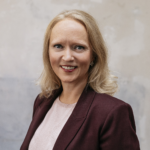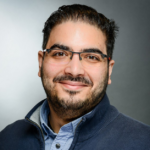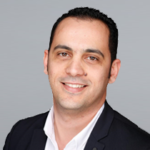
Prof. Dr. Annika Schach
Doctorateat at the Moritz Arndt University of Greifswald in German Linguistics, and Founder of Segmenta Futurista GmbH
read more
Doctorateat at the Moritz Arndt University of Greifswald in German Linguistics.
She studied social sciences and psychology at the Gerhard Mercator University Duisburg focusing on culture and communication.
She was the head of Communications in the State Capital Hanover, and the head of Communications & Marketing Department
at the Hanover University of Applied Sciences and Arts.
Since 2020, she has been the founder and managing director for segmenta futurista GmbH.

Prof. Dr. Rand Kouatly
Senior International Academic and Executive Leader, Professor, and Researcher
read more
Prof. Dr. Rand Kouatly is a senior international academic and executive leader, professor, and researcher, with 20+ years of experience and deep understanding in higher education, education technology, corporate knowledge management, and executive training sectors, and 10+ years of international experience as senior project management and consulting in multiple technology, market, and business.
He is an international scholar and expert in telecommunication engineering and software development, frontend and backend development, artificial intelligence, deep learning, artificial neural networks, including the fields of pattern recognition, audio and speech processing, and speech and speaker recognition, e-learning, project management, and business consultancy.
He is well experienced in leading small companies, start-ups, projects, and team leaders. Moreover, he has been driven successfully in multiple roles such as dean and vice dean, academic researcher and supervisor, and study program creator in various public and private universities.
Professor and Program leader at the University of Europe, for Software Engineering (MSc, BSc) and Digital Business and Data Science Programs, Berlin and Potsdam.”

Prof. Dr. Shadi Albarqouni
Professor of Computational Medical Imaging Research at the Technical University of Munich
read more
Professor of Computational Medical Imaging Research.
Since 2020, Albarqouni has been working as an AI junior research group leader at Helmholtz AI, Munich.
His research focuses on the development of AI models in medicine, interpretable deep learning, robustness, uncertainty quantification, and federated learning. Albarqouni earned his bachelor’s and master’s degrees in electrical engineering from IU Gaza, Palestine, in 2005 and 2010, respectively.
Before receiving his summa cum laude PhD in computer science in 2017, he worked as a Senior Research Scientist & Team Lead at CAMP and led the Medical Image Analysis (MedIA) at the Technical University of Munich.

Dr. Zeyd Boukhers
Data Scientist and AI Specialist from the University of Siegen, Germany
read more
Zeyd Boukhers is a data scientist and AI specialist.
Zeyd is the co-leader of the FAIR Data & Distributed Analytics Group at the Fraunhofer Institute for Applied Information Technology -FIT.
He obtained his Bachelor’s degree in Computer science from University of Science and Tehnology of Oran, Algeria where he has performed his master’s in Pattern Recognition and Artificial Intelligence.
He received his Engineering Doctorate in Pattern Recognition from the University of Siegen, Germany.

Prof. Dr. Rami Abu Jamra
Professor of Medical Genomics at the Faculty of Medicine in Leipzig
read more
A Medical School graduate from Damascus University, he performed his doctoral thesis, and specialization in Human Geneticist (specialist), then conducted his postdoctoral lecture qualification (Habilitation) at the Institute of Human Genetics in Bonn.
After focusing on complex genetics of psychiatric disorders, his research focus since 2008 has been the genetics of intellectual disability in special and of rare disorders in general.
After he led a working group in Erlangen between 2010 and 2014, he has been the Medical Director of Centogene in 2015. Since 2016 he has been a consultant (senior physician) at the Institute of Human Genetics in Leipzig, the deputy of the Institute Director, the Medical Director of the MVZ, and a professor of Medical Genomics at the Faculty of Medicine in Leipzig.
The main tasks are genetics diagnostics, research on the genetics of intellectual disability, teaching, as well as strategic development of efficient clinical genomics.

Prof. Dr. Paul Hoyningen-Huene
professor of philosophy at the Leibniz Universität Hannover
read more
Paul Hoyningen-Huene is professor emeritus of philosophy at the Leibniz Universität Hannover (Germany) and lecturer for philosophy of economics at the Dept. of Economics at the Universität Zürich (Switzerland).
He received a PhD in theoretical physics in 1975 before switching to philosophy of science. He was a Visiting Scholar at the Massachusetts Institute of Technology, Department of Linguistics and Philosophy, with Professor T.S. Kuhn, from 1984 to 1985, and a Senior Visiting Fellow at the Center for Philosophy of Science, University of Pittsburgh, from 1987 to 1988.
His main research interests are the dynamics of scientific theory change, especially Kuhn, Feyerabend, and incommensurability; the nature of science; reduction and emergence; the ethics of science; metaethics; the philosophy of logics, of physics, of biology, of history, of psychology, and of economics; and the philosophy of soccer.
Hoyningen-Huene is best known for his books Reconstructing Scientific Revolutions: Thomas
S. Kuhn’s Philosophy of Science (University of Chicago Press, 1993), Formal Logic: A
Philosophical Approach (Pittsburgh University Press, 2004), and Systematicity: The Nature of Science (Oxford University Press, 2013).
